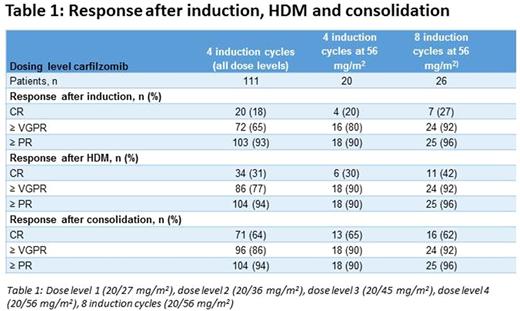Abstract
Introduction
This phase 2 dose escalation trial of the European Myeloma Network investigated the combination of Carfilzomib with Thalidomide and dexamethasone (KTd) in newly diagnosed, transplant-eligible patients with multiple myeloma (MM) as induction and consolidation treatment (abstract ASH 2016 # 1141).
We investigated the effect of intensified induction with 8 cycles of KTd (56 mg/m2) as compared with standard 4 cycles (27 - 56 mg/m2) on depth of response before and after high-dose Melphalan (HDM).
Methods
In this multicenter, open-label phase 2 trial, patients aged between 18 and 65 years with transplant eligible, newly diagnosed symptomatic MM were included. Four dose levels of Carfilzomib combined with Thalidomide and dexamethasone (KTd) for 4 cycles of induction therapy were used. The dose of Carfilzomib was 20 mg/m2 i.v. on days 1, 2 followed by 27, 36, 45 or 56 mg/m2 on days 8, 9, 15, 16 of cycle 1 and on days 1, 2, 8, 9, 15 and 16 of cycles 2 to 4. Thalidomide dose was 200 mg orally on days 1 through 28 and dexamethasone 40 mg orally on days 1, 8, 15 and 22 of a 28-day cycle. After induction, stem cell harvest was performed after Cyclophosphamide priming (2 to 4 g/m2) and G-CSF. Following HDM (200 mg/m2) and autologous stem cell transplantation, consolidation treatment consisted of 4 cycles of KTd in the same schedule except for a lower dose of Thalidomide (50mg) (abstract ASH 2016 # 1141). Next we investigated the potential benefit of prolonged induction therapy on response depth prior to and following HDM by using 8 cycles of KTd at the highest dose of Carfilzomib (56mg/m2) in the same schedule.
The primary endpoint was response after induction therapy, specifically complete response (CR) and very good partial response (VGPR). Other endpoints were safety, progression-free survival (PFS) and overall survival (OS).
Results
A total of 137 eligible patients were included. We report the response of 26 patients treated with 8 cycles of KTd induction therapy versus 111 patients treated with 4 cycles of KTd induction therapy with different dose levels of Carfilzomib. Median follow-up was 48 months [range 8-81 months]. Median age was 57 years. ISS stages I/II/III were 43%/35%/21% respectively.
With 8 KTd, response after induction was CR/sCR in 27%, ≥ VGPR in 92% and ≥ PR in 96%. In contrast, with 4 KTd at 56 mg/m2 (20 patients) response after induction was CR/sCR in 20%, ≥ VGPR in 80% and ≥ PR in 90%. CR/sCR rate with 8 KTd increased to 42% after HDM and to 62% after consolidation treatment. In comparison, with 4 KTd at 56 mg/m2 CR/sCR rate increased to 30% after HDM and 65% after consolidation treatment. All dose levels combined given for 4 induction cycles showed response after induction of CR/sCR in 18%, ≥ VGPR in 65% and ≥ PR in 93%. CR/sCR rate increased to 31% after HDM and to 64% after consolidation treatment. See Table 1.
Response based on risk status by ISS/FISH with 8 KTd showed a difference in CR/sCR rate after consolidation between standard risk (10/13, 77%) and high risk (3/8, 38%). High risk was defined as t(4;14) and/or del17p and/or add1q and/or ISS3. With 4 KTd at 56 mg/m2 CR/sCR rate in standard and high risk patients was 100% (7/7) and 50% (5/10) respectively. In all dose levels combined given for 4 induction cycles CR/sCR rate was 70% (32/46) and 58% (25/43) in standard and high risk patients respectively.
Cardiac events grade 3 and 4 in patients treated with 8 KTd occurred in 2 patients (8%, heart failure). In comparison with 4 KTd at 56 mg/m2 heart failure grade 3 was reported in one patient (5%). In all dose levels combined given for 4 induction cycles cardiac events grade 3 and 4 included three patients with heart failure and 1 patient with chest pain (4%).
In patients treated with 8 KTd PFS and OS at 12 months was 100%. With 4 KTd at 56 mg/m2 PFS and OS were 95% and 100% respectively and in all dose levels combined given for 4 induction cycles PFS and OS were 90% and 95% respectively at 12 months. Before ASH we will update results of PFS and OS.
Conclusions
Treatment with 8 induction cycles of KTd resulted in a deeper response before HDM and autologous stem cell transplantation. However, depth of response was comparable after consolidation treatment between patients treated with 4 and 8 induction cycles. Effect on survival will be analyzed when longer follow-up is available.
Zweegman: Celgene: Other: advisory board participation, Research Funding; Janssen: Other: advisory board participation, Research Funding; Takeda: Other: advisory board participation, Research Funding; Amgen: Other: advisory board participation. Kersten: Novartis Pharmaceuticals Corporation: Honoraria; Mundipharma: Honoraria; Gilead Sciences: Honoraria; Kite Pharma: Honoraria; Roche: Honoraria, Research Funding; Celgene: Honoraria, Research Funding; Millennium/Takeda: Honoraria, Research Funding; BMS: Honoraria; MSD: Honoraria; Amgen: Honoraria. Minnema: Servier: Consultancy; Janssen: Consultancy; Celgene: Consultancy, Research Funding; Takeda: Consultancy; Amgen: Consultancy. Palumbo: Celgene: Consultancy, Honoraria, Research Funding; Janssen-Cilag: Consultancy, Honoraria, Research Funding; Takeda: Consultancy, Employment, Equity Ownership, Honoraria, Research Funding; Novartis: Consultancy, Honoraria, Research Funding; Amgen: Consultancy, Honoraria, Research Funding; Sanofi: Consultancy, Honoraria, Research Funding; Bristol-Myers Squibb: Consultancy, Honoraria, Research Funding, Speakers Bureau; Genmab A/S: Consultancy, Honoraria, Research Funding; Merck: Consultancy, Honoraria, Research Funding; Binding Site: Research Funding. Lokhorst: OncoImmune: Research Funding; Janssen: Membership on an entity's Board of Directors or advisory committees, Research Funding; Genmab: Membership on an entity's Board of Directors or advisory committees, Research Funding; Amgen: Membership on an entity's Board of Directors or advisory committees, Research Funding. Broyl: Celgene: Honoraria; Janssen: Honoraria; Amgen: Honoraria. Iskander: Amgen: Employment, Equity Ownership. Sonneveld: Celgene, Amgen, Janssen, Karyopharm, Takeda: Consultancy, Honoraria, Research Funding; Celgene Corporation, Amgen, Janssen, Karyopharm, PharmaMar, SkylineDx: Honoraria; Celgene Corporation, Amgen, Janssen, Karyopharm, SkylineDx, PharmaMar: Consultancy.
Author notes
Asterisk with author names denotes non-ASH members.


This feature is available to Subscribers Only
Sign In or Create an Account Close Modal